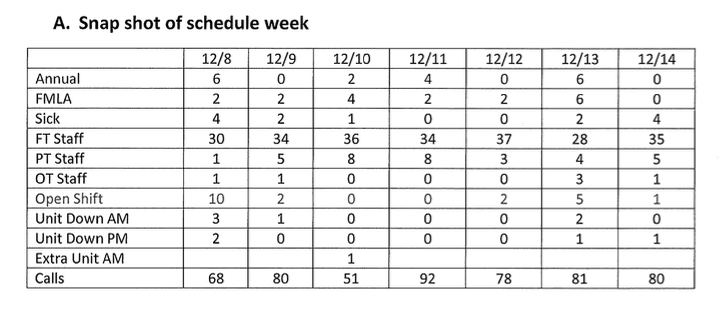In January, two of Buncombe County’s previous county managers, Wanda Greene and her successor Mandy Stone, pleaded guilty in federal court to corruption charges.
This month, the Buncombe County Board of Commissioners will vote on the selection of a new county manager during a special meeting at 4 p.m. Feb. 5. in the third floor conference room at 200 College St. in downtown Asheville.
Board Chair Brownie Newman said commissioners have winnowed about 40 applications down to a single candidate.
“Narrowing it to one wasn’t something that everyone immediately came to the same conclusion on,” Newman said, “but I believe there is a lot of agreement in the commission now about the candidate that we’re focused on.”
On Thursday, Newman declined to identify the applicant that commissioners have zeroed in on.
Commissioners have held several closed meetings over the course of the month to consider applicants. The chosen candidate will be at the meeting Feb. 5.
Ambulance services
Interim County Manager George Wood wants commissioners to hire four paramedics by March 1 to solve a staffing shortage in the EMS system.
“It is apparent that we are short on full-time personnel, and are having to make up for it by calling back our personnel for overtime, and using part-time personnel,” he wrote in a memo to commissioners.
Including benefits, Wood said each paramedic would cost $83,620 per year or $334,480 total. Because they would be starting partway through a fiscal year, the cost would be $111,493.33 in FY 2019.
From Dec. 8 to Dec. 14, Wood said, there were four days in which county EMS services were down one or more ambulances in the morning or afternoon because of staffing shortages.

“It goes with out saying that the EMS response times can be literally life-and-death situations,” Wood wrote. “So, this service has to be adequately staffed at all times.”
Buncombe County’s current system has 19 ambulances, not counting backups and reserve units. Ten units come from Buncombe County Emergency Medical Services, seven come from six local volunteer fire departments and two come from the Buncombe County Rescue Squad.
Wood said he discovered the staffing shortage while exploring a request by for-profit ambulance service Medic to use the county’s 700 mhz radio system and take calls when its units are nearest to an incident.
Buncombe County licenses Medic to provide “non-emergency medical transport” in unincorporated parts of the county. Because municipalities in the county have not adopted Buncombe’s franchise ordinance, Medic can operate as an ambulance service within those municipalities, Wood wrote.
“While our franchise is technically limited to [non-emergency medical transport] calls, we use Medic as an ambulance when we are short in coverage areas,” Wood wrote. “Therefore, we need to amend this franchise ordinance to reflect how we actually operate.”
Medic has seven state-certified ambulances, Wood wrote.
Subject to several conditions, Wood recommends that commissioners change the current franchise agreement to allow full ambulance service by Medic in unincorporated parts of the county for one year “to see how it works out.” Commissioners would have the option of extending the service if they are pleased with the results.
Affordable housing
Wood has recommended that commissioners put together a formal process for affordable housing funding requests. Currently, such requests typically fall under the category of “special asks,” the county’s term for funding requests that go directly to the Board of Commissioners rather than through one of the pre-existing application processes.
“Currently, no money is budgeted annually for [special asks], as the county reacts to these individual requests as they are received,” Wood and Planning Director Nathan Pennington wrote in a memo to commissioners. “Obviously, this favors the entity that makes a request first.”
Affordable housing funding requests can exceed $5 million per year, Wood and Pennington wrote.
Staff suggested that commissioners set aside a specific amount for affordable housing in the annual budget and develop an application process for affordable housing developers seeking county funding.
Staff in the county planning and finance departments would review funding requests and work with the county manager’s office to put together recommendations for the Board of Commissioners to consider.
The system could be put in place by next fall, Wood and Pennington wrote.
They also suggested that commissioners seek affordable housing money from the Dogwood Health Trust.
The trust will award funding to entities dealing with “social determinants of health,” societal factors outside the human body that impact health.
“We believe that affordable, safe housing meets that definition,” Wood and Pennington wrote.
On Jan. 15, commissioners asked staff to consider a funding process for affordable housing after fielding a “special ask” from Mountain Housing Opportunities to help pay for a 95-unit apartment complex in Swannanoa. The apartments would be rented out to families making at or below 60 percent of area median income.
MHO was initially seeking a $2.2 million loan at a 0 percent interest rate over a 20-year term, which would be repaid with a balloon payment of $2.2 million at the end of that term.
Wood and Pennington recommended some changes to this proposal. “[The MHO request] asks that you not receive any of your loan money back until the end of a 20-year period, and that you receive no interest,” they wrote. “That ties your money up for 20 years.”
Pennington and Wood suggested that commissioners set a 2.25 percent annual interest rate on the loan and that MHO make interest payments every six months and pay 5 percent of the principal loan amount, $110,000, every year. The memo said the county would provide MHO with the $2.2 million once the project is done.
By asking MHO to repay a portion of the principal loan balance annually, commissioners would be able to reinvest that money into four additional projects worth $2 million each over that 20-year timeframe, Wood and Pennington wrote.
“You put the $2.2 million back into use much more quickly this way,” they wrote. “This is the far better option for getting more affordable housing in place as quickly as possible.”
The Buncombe County Board of Commissioners will meet 5 p.m. Tuesday, Feb. 5 in the third floor conference room at 200 College St. in downtown Asheville. Click here to see the full agenda and supporting documents.




Now that they have a new County Manager. we’ll get to hear what happened with that study on whether to do a study on getting water from Canton to Candler, right?